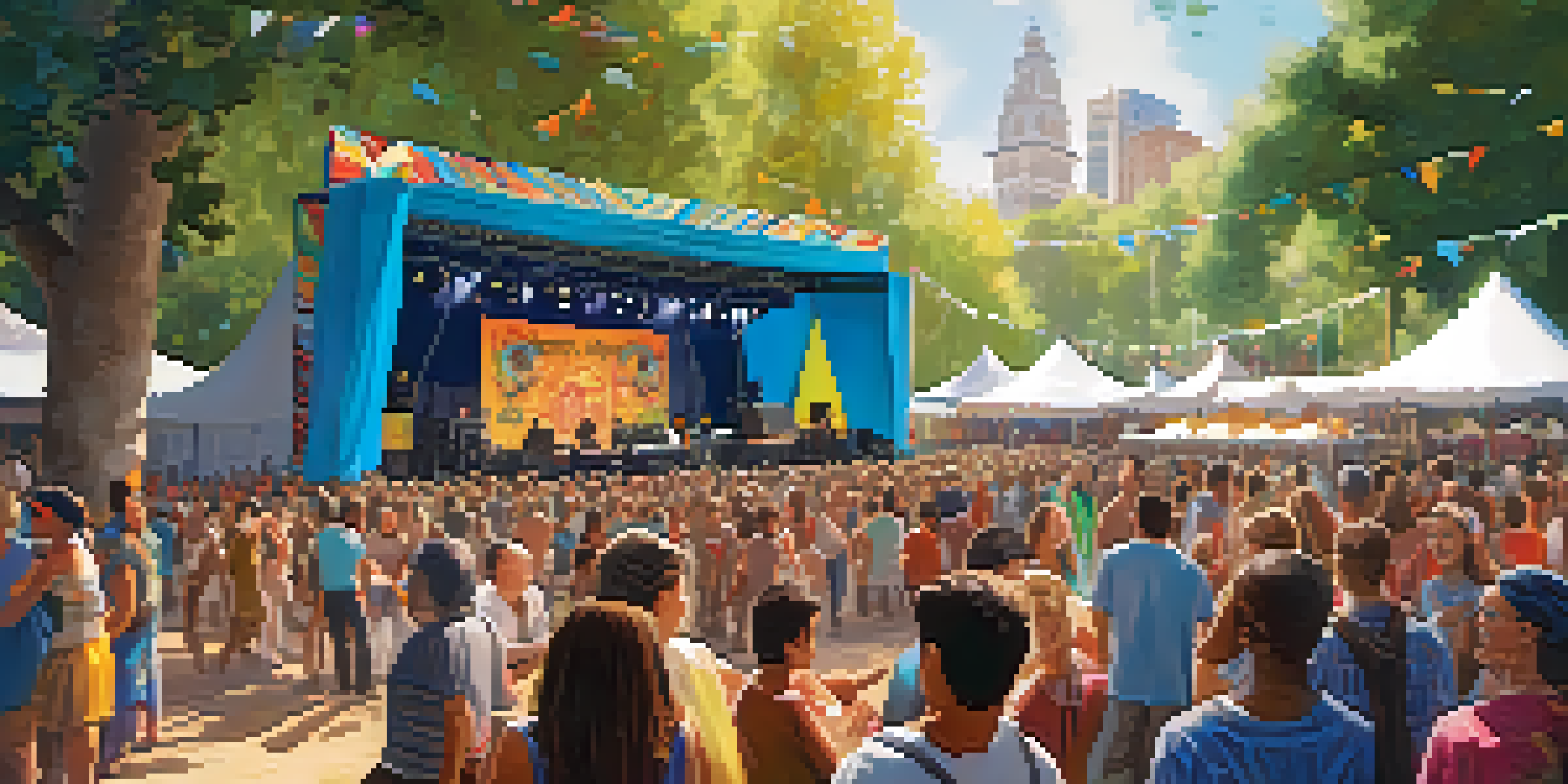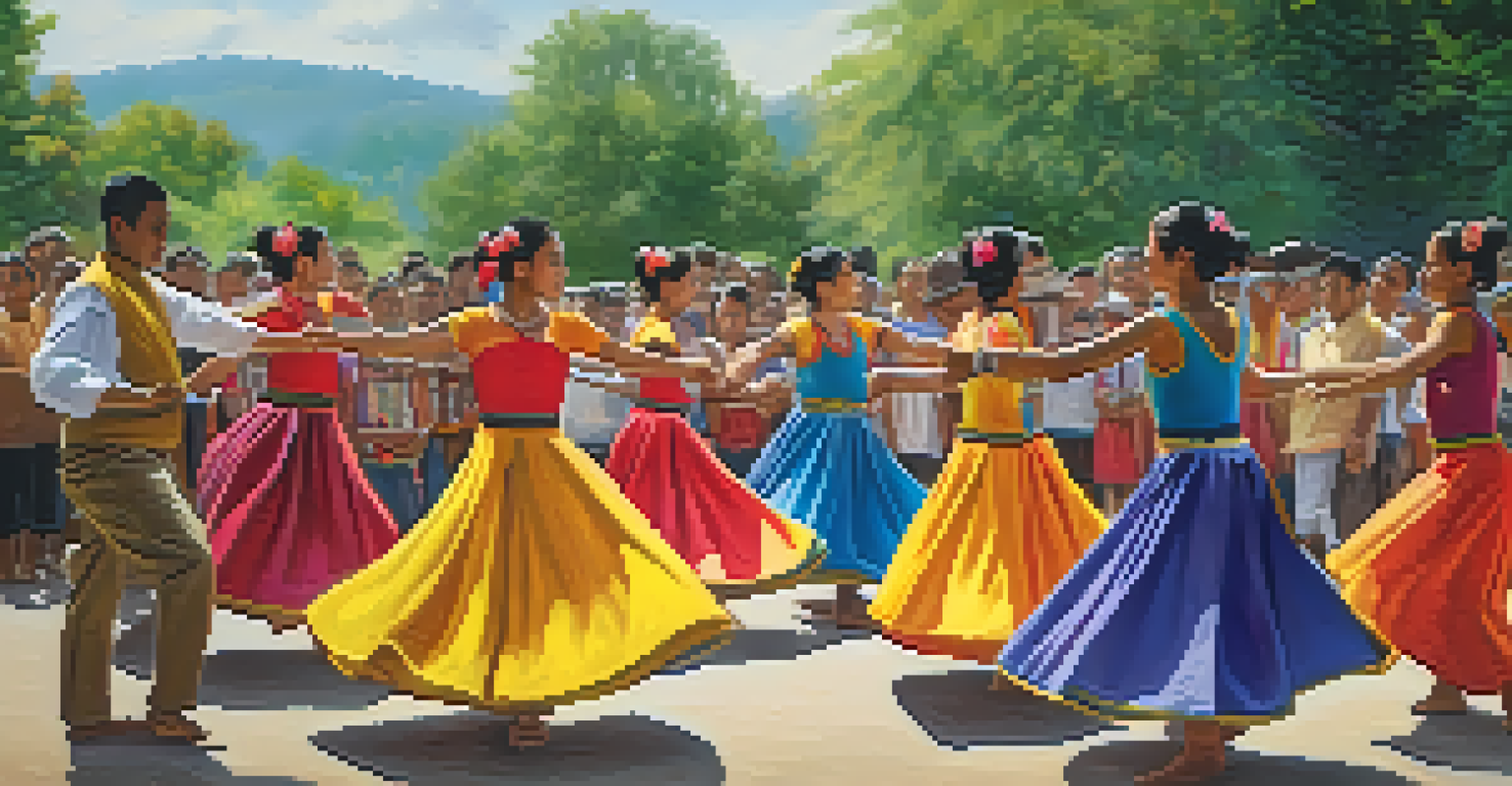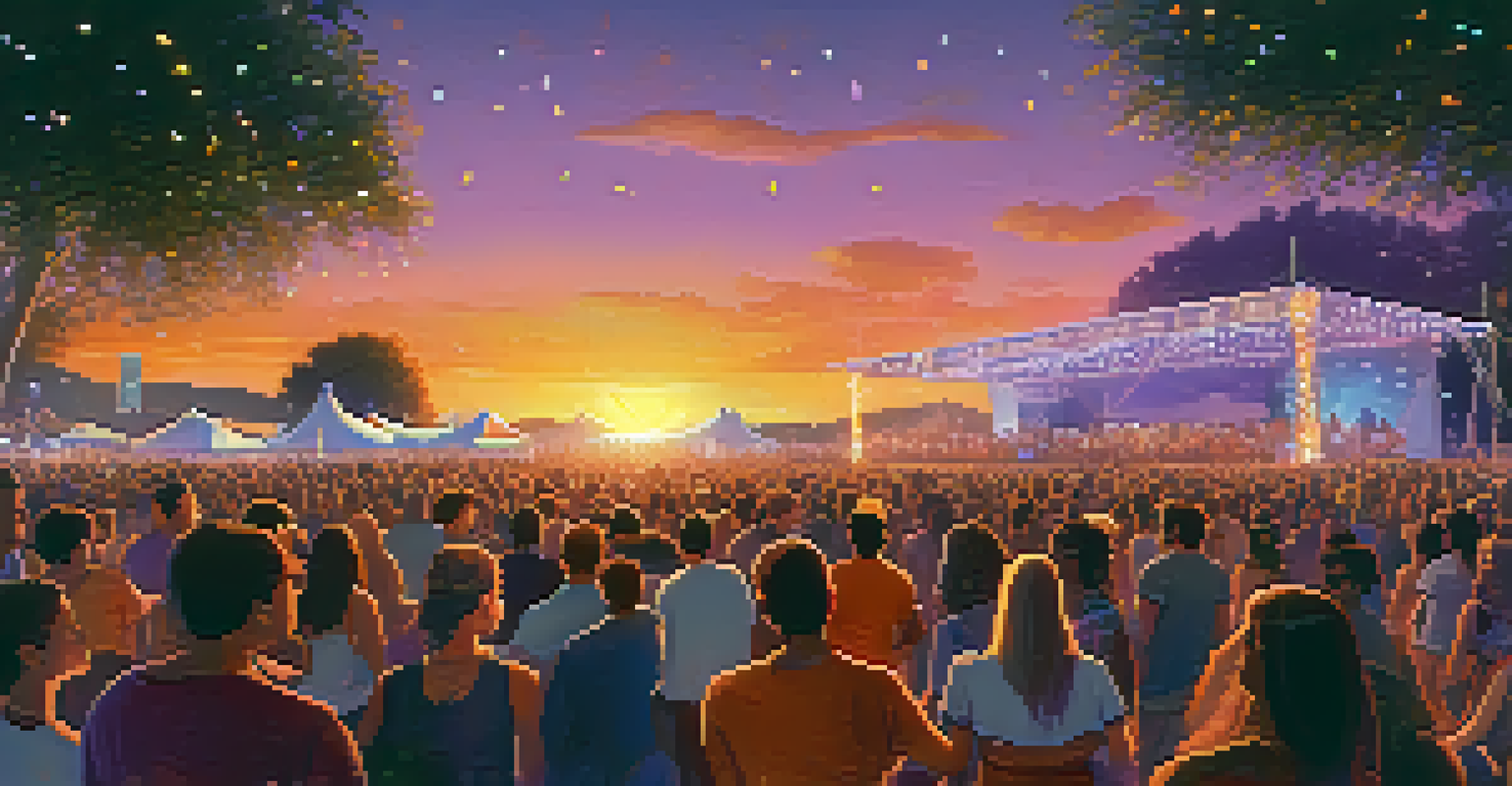The Role of Music Festivals in Shaping Cultural Communities

The Essence of Music Festivals in Cultural Identity
Music festivals serve as vibrant expressions of diverse cultural identities. They bring together a variety of musical genres, showcasing everything from folk traditions to contemporary sounds. This melting pot of music not only celebrates individual cultures but also highlights the interconnectedness of different communities. As attendees immerse themselves in these experiences, they often find themselves reflecting on their own cultural roots.
Music brings people together in a way that no other force can.
Consider how a local folk festival can revive interest in traditional music and dance, encouraging younger generations to participate. These events can become pivotal moments for cultural transmission, where stories and practices are passed down. By fostering an environment where local musicians and artists can shine, festivals play a crucial role in preserving and promoting cultural heritage.
Moreover, the shared experience of enjoying live music creates a sense of belonging among festival-goers. As people bond over their favorite performances and artists, they form connections that extend beyond the festival grounds. This collective experience cultivates a stronger community identity, which is essential in today’s increasingly globalized world.
Building Community Connections Through Shared Experiences
One of the most powerful aspects of music festivals is their ability to connect people from various backgrounds. Attendees often find themselves mingling with individuals they might never meet in their daily lives. This interaction fosters understanding and appreciation for different cultures, enhancing social cohesion within the community.

For example, at a multicultural music festival, you might find food stalls offering traditional dishes from various regions, alongside performances that reflect this diversity. Such an environment encourages conversations and exchanges that build relationships among attendees. It’s a beautiful reminder that music can transcend barriers and bring people together.
Cultural Identity Through Music Festivals
Music festivals celebrate diverse cultural identities and foster connections among attendees, helping to preserve and promote cultural heritage.
As these connections deepen, communities can become more resilient. When people feel a sense of belonging and camaraderie, they are more likely to collaborate on local initiatives, support one another, and work together toward common goals. Festivals, therefore, are not just entertainment; they are essential for fostering community spirit and collaboration.
Economic Impact of Music Festivals on Local Communities
Music festivals can also drive significant economic growth in local communities. They attract thousands of visitors, which can benefit hotels, restaurants, and local businesses. This influx of tourism creates job opportunities and stimulates the economy, making festivals an essential component of community development.
Festivals are a way to celebrate the cultural identity of a community and bring it to life through music.
Take the example of a small town that hosts an annual music festival. The event not only brings in ticket sales but also boosts local commerce as visitors dine at nearby restaurants and shop at local stores. This ripple effect can have a lasting impact, helping businesses thrive and even encouraging new enterprises to open in the area.
Furthermore, the revenue generated from these festivals can be reinvested into the community. Local governments and organizations may allocate funds to improve infrastructure, support local artists, or create educational programs. This cycle of investment ensures that the benefits of the festival extend far beyond the event itself.
Promoting Local Artists and Cultural Expression
Music festivals provide a platform for local artists to showcase their talents and gain exposure. Many emerging musicians can struggle to find performance opportunities, but festivals often prioritize local talent, allowing them to reach wider audiences. This exposure is crucial for their growth and success in the music industry.
By featuring local artists, festivals help to create a unique cultural tapestry that reflects the community's identity. Attendees not only enjoy performances but also discover new sounds and styles that may resonate with their own experiences. This celebration of local talent fosters pride among residents and strengthens community ties.
Economic Growth for Local Communities
Festivals drive significant economic growth by attracting visitors, boosting local businesses, and creating job opportunities.
Moreover, these events often encourage collaboration among artists, leading to innovative musical fusions. When musicians from different backgrounds come together, they can create something entirely new, enriching the cultural landscape even further. In this way, music festivals become incubators for creativity and cultural expression.
Creating Safe Spaces for Diverse Communities
Music festivals can serve as safe spaces where individuals feel accepted and free to express themselves. They create environments that celebrate diversity and promote inclusivity, allowing people from all walks of life to come together in harmony. This aspect of festivals is particularly important in today’s world, where many face discrimination or exclusion.
For instance, LGBTQ+ music festivals have emerged as vital spaces for community building and empowerment. These festivals provide a platform for marginalized voices, fostering acceptance and understanding among attendees. The celebration of diversity within these spaces encourages empathy and connection, breaking down barriers that often divide society.
In addition to promoting inclusivity, music festivals often prioritize safety and well-being. Many events have implemented measures to ensure that everyone feels comfortable, such as establishing safe zones and providing resources for mental health support. By cultivating a welcoming atmosphere, festivals can become transformative experiences for individuals looking to connect and celebrate their identities.
Fostering Environmental Awareness Through Music Festivals
In recent years, many music festivals have embraced sustainability initiatives, using their platforms to promote environmental awareness. As attendees gather to enjoy music, they are also educated on pressing issues like climate change and conservation. This dual focus helps raise consciousness about the impact of human activities on the planet.
For example, some festivals now incorporate eco-friendly practices, such as recycling programs, biodegradable materials, and sustainable energy sources. By showcasing these initiatives, organizers encourage attendees to adopt environmentally friendly habits in their own lives. This shift toward sustainability reflects a growing recognition of the responsibility we all share in protecting our planet.
Inclusivity and Safe Spaces
Music festivals serve as safe spaces that promote diversity and inclusivity, allowing individuals to express themselves freely.
Additionally, festivals often partner with local environmental organizations to promote conservation efforts. This collaboration not only amplifies the message of sustainability but also strengthens community ties, as residents come together to support a common cause. Ultimately, festivals can inspire positive change, making a lasting impact on both attendees and the environment.
The Future of Music Festivals in Cultural Development
As we look to the future, the role of music festivals in shaping cultural communities is likely to grow even more significant. As our societies evolve, festivals will continue to adapt, reflecting the changing values and needs of the communities they serve. This adaptability is key to ensuring that they remain relevant and impactful.
With the advent of technology, virtual music festivals have emerged, expanding the reach of these cultural gatherings beyond geographical limitations. This innovation allows people from all over the world to participate, further enriching the cultural exchange that festivals promote. However, the challenge remains to maintain the sense of community and connection that in-person events foster.

Ultimately, music festivals will continue to be vital platforms for cultural expression, community building, and social change. As they evolve, they will likely inspire new generations to engage with their cultural identities and work together toward a more inclusive and vibrant future.